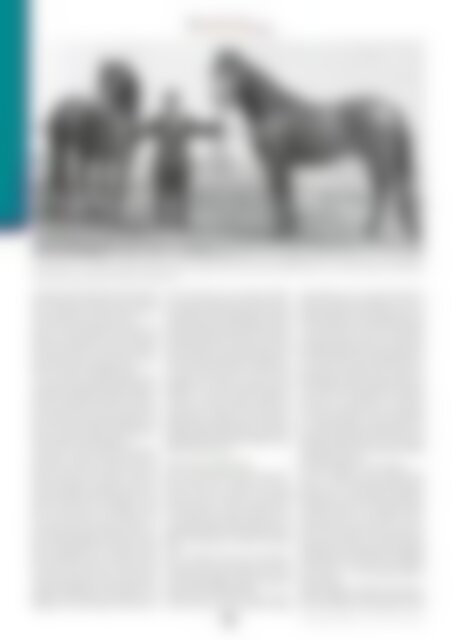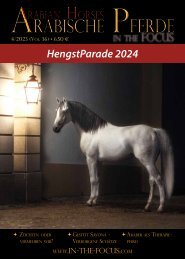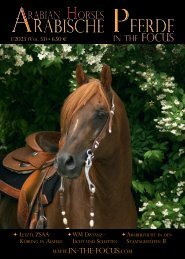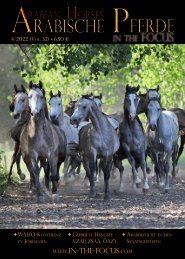Arabische Pferde IN THE FOCUS 4/2020 (Vol. 24) - public
Zeitschrift für Liebhaber und Züchter Arabischer Pferde
Zeitschrift für Liebhaber und Züchter Arabischer Pferde
Sie wollen auch ein ePaper? Erhöhen Sie die Reichweite Ihrer Titel.
YUMPU macht aus Druck-PDFs automatisch weboptimierte ePaper, die Google liebt.
History<br />
Jan Ziniewicz holding Almifar (grandson of Witraz), and Czort (son of Wielki Szlem), he was responsible for their sire and grandsire during the bombing<br />
of Dresden. - Jan Ziniewicz hält hier Almifar (Enkel von Witraz) und Czort (Sohn von Wielki Szlem), er war für ihre Väter und Großväter<br />
während der Bomennacht in Dresden verantwortlich..<br />
Janów. By 1944, when they had to evacuate<br />
from the Russian advance once more, there<br />
were 170 stallions and <strong>24</strong>5 horses who had<br />
to leave, this time, at least, by train.<br />
In early 1945, though, they had to move yet<br />
again, in bitter weather. Some foals and<br />
five heavily pregnant mares were shipped<br />
by train, but the rest of the horses had to<br />
walk. Erika Schiele (The Arab Horse in Europe)<br />
describes what happened next:<br />
"An icy wind was whistling about them,<br />
rain and snow lashed them alternately, the<br />
roads were jammed with refugees. Ninety of<br />
the horses were harnessed to carts in pairs,<br />
the mares with foals at foot being tied to<br />
the cart-tails. The young stock were led in<br />
hand, The German colonel von Bonnet led<br />
forty men, each riding a stallion with another<br />
in hand, in a separate party.<br />
At the fall of night, stabling could only<br />
be found for a few of the mares. Most of<br />
them had to spend the night on the road,<br />
hungry and cold. The stallions could not<br />
take a stand-easy, they could not be held<br />
in hand along the roadside. Colonel von<br />
Bonnet resolved to march straight on with<br />
them to the barracks at Dresden. At half<br />
past one they were in the middle of the<br />
city, which was under heavy air attack. In<br />
vain they sought cover under the trees in a<br />
park. Bombs exploded all around, veiling<br />
them in smoke and fire. The stallions went<br />
mad and broke loose. In less than a minute<br />
there were forty stallions milling around<br />
loose, then fifty, then sixty. The men were<br />
in almost equal panic. All but a puny-looking<br />
little stud-groom by the name of Jan<br />
Ziniewicz, who forgot the danger and all<br />
thought of his own safety, so intent was<br />
he on the two star sires, Witraz and Wielki<br />
Szlem, that had been entrusted to him.<br />
An incendiary bomb exploded close beside<br />
them, Witraz’s tail caught alight, so that he<br />
raged and reared up, but Ziniewicz did not<br />
let go the headrope. The blood ran from his<br />
lacerated palms, but he hung on, and at the<br />
other end of the rope was the future hope<br />
of Arab breeding for Poland. Of eighty stallions<br />
only twenty remained in the morning.<br />
Four days were spent in a search for the<br />
stragglers, but only thirty-eight could be<br />
found, and one of these had already been<br />
hitched to a gypsy’s wagon. Twenty-two<br />
were known to be dead. Dr Andrzej Krzysztalowicz<br />
was in charge of the mare party,<br />
riding Amurath Sahib, and as he rode into<br />
Dresden he had to pass the carcasses of his<br />
dead stallions lying on the roadside, which<br />
almost broke his heart."<br />
Stopover in Hostouň<br />
Some of the best horses from Janów Podlaski,<br />
though, never made the march to<br />
Dresden and were spared the carnage<br />
and terror there, because the Nazis had<br />
removed them to a stud at Hostouň (Hostau<br />
in German). They were, however, still in<br />
very grave danger, under threat from the<br />
advancing Soviet Army. Amongst them was<br />
Witez II, half-brother to Witraz and Wielki<br />
Szlem.<br />
Also at Hostouň were all the Lipizzaner<br />
mares and foals and young stock, taken<br />
from Piber by the Nazis. And here the story<br />
of the Polish Arabians becomes entwined<br />
with the Spanish Riding School.<br />
Hostouň was still under German control<br />
in April 1945, but U.S. and Soviet troops<br />
were closing in on it. In the early hours of<br />
26 April, a German intelligence unit surrendered<br />
to the Americans; a little later, over a<br />
shared breakfast, the German general and<br />
Colonel Charles Hancock Reed discovered<br />
a mutual interest in horses. The German<br />
general produced photos of the Lipizzaners<br />
and Polish Arabians held at Hostouň, and<br />
mentioned that several hundred Allied prisoners-of-war<br />
were kept captive there too.<br />
Reed agreed that both horses and humans<br />
should be rescued, and messages were sent,<br />
one via radio to General Patton, requesting<br />
permission to undertake the operation,<br />
and one via bicycle to Hostouň, to arrange<br />
for a German officer to come through the<br />
U.S. lines that night to agree to terms. Patton<br />
gave his permission, and at 8 p.m. that<br />
evening, Captain Lessing, the veterinarian<br />
at Hostouň, rode up on a Lipizzaner stallion<br />
and leading a second.<br />
Reed described how events unfolded:<br />
"He was brought to 2nd Cavalry Headquarters<br />
– dinner had been delayed pending<br />
his arrival – after cocktails and dinner,<br />
agreement was reached that, provided we<br />
furnished an officer to show good faith to<br />
ride back with him, he, Captain Lessing,<br />
would be able to arrange for the surrender<br />
of Hostau (officers and men there were<br />
mostly ex-horsemen). He stated however,<br />
that between us and Hostau were stationed<br />
elements of an SS Division who would fight.<br />
That bothered us very little as we planned<br />
a quiet day or so – then a great attack to<br />
over-run them.<br />
Captain Thomas M. Stewart of Tennessee,<br />
a fine horseman and son of the then Senator<br />
from Tennessee, volunteered and rode<br />
70<br />
© ARABISCHE PFERDE - <strong>IN</strong> <strong>THE</strong> <strong>FOCUS</strong> 4/<strong>2020</strong>
















